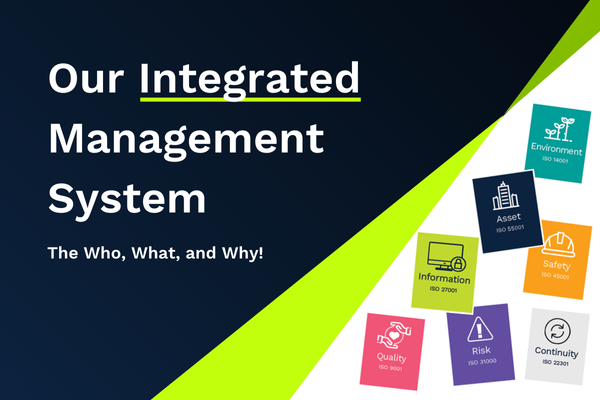It’s no secret that we enjoy using a lot of acronyms here at Programmed. One of the more common ones you may have come across is ‘IMS’, otherwise known as ‘Integrated Management System’. This system forms a fundamental part of the way we function as a business, but what exactly does it mean, and why is it so important?
What is an Integrated Management System (IMS)?
An Integrated Management System (IMS) combines multiple management system standards into one complete, unified framework, which allows an organisation to work with unified objectives. Using this unified framework offers many benefits when compared to running individual systems parallel to each other.
Essentially, you can think of the IMS as a central repository for all the documents and information you need regarding processes, standards, and management systems across the business.
Why do we use an IMS at Programmed Facility Management?
Our Certified IMS is our ticket to ride! No ticket, no ride.
For all of our customers, it's a requirement to have some or all of the IMS individual certification (in some cases, aligned) to be allowed to tender in the first instance, and we must maintain our certification throughout the duration of our term.
Additionally, some of the key benefits of using an IMS include the following:
.png?width=700&height=835&name=IMS%20benefits%20(1).png)
What does the Programmed Facility Management IMS look like?
The Programmed Facility Management IMS integrates several key management standards into one cohesive system. This comprehensive approach streamlines process, enhances efficiency, and ensures compliance across various aspects of our organisation.
Our IMS encompasses a variety of standards, and looks a bit like the following:

Who is responsible for managing Programmed Facility Management's IMS?
The Business Integrity Team (BIT) is the conduit to assist Programmed Facility Management in the management and administration of the IMS.
Our BIT supports Programmed’s operational contracts in their provision or service delivery and custodianship over our customer assets, enabling the effective implementation of new contracts and acquisitions.
The team provides tools, guidance, and governance to help minimise risks so that operational teams can operate efficiently, securely, and successfully.
How do I use the IMS and how can I provide feedback?
One way to use the IMS is through simply obtaining documents from the intranet. This can be done from one of the many drop down menu items on the intranet page.
We also control these documents through a specific numbering convention on the footer of each document. This is so that we can keep track of our inventory of documents. You can find more information about document control here.
To support the IMS, before creating a new document, make sure you're not creating a duplicate version by checking with the Business Integrity Team (BIT) first.
To provide feedback for existing IMS documents, you can contact the document owner directly or BIT.
To create an improvement in ProSafe specific to the documents, a process, or other activity, visit this link. These improvements could be about the IMS, customer service, efficiency, new technology, waste reduction, strengthening relationships, and many more. You can also get inspired on ways to suggest improvements through iHub.
What is the current state of Programmed Facility Management’s IMS and what are our goals?
The Programmed Facility Management IMS currently includes 1,398 individual documents. Our aim is to continually refine and reduce this number by encouraging everyone at Programmed Facility Management to use the IMS and provide feedback to help us improve.
Through reducing duplication of effort and fully utilising the IMS across the organisation to ensure adherence to a common way, we can drive efficiencies and facilitate the next phase of growth.




